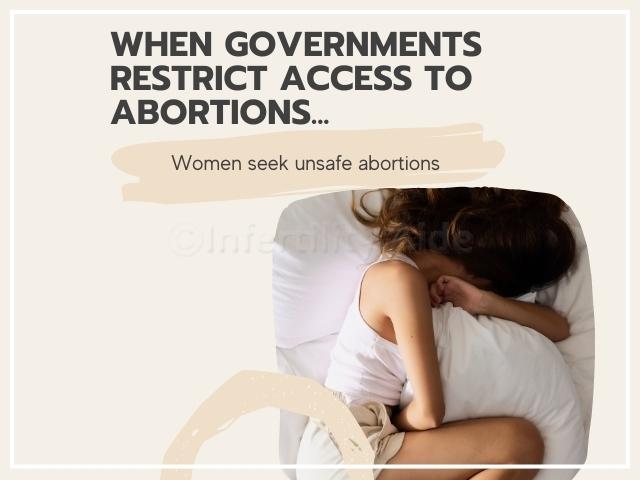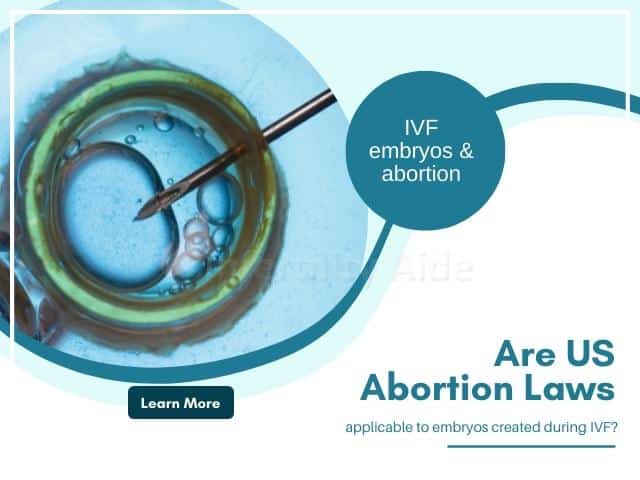Are you worried that the latest developments on US abortion bans will affect your IVF treatments?
If you’re trying to conceive with IVF or are still in the process of planning your fertility treatments, the looming changes in abortion laws might have raised questions, fears, and concerns pertaining to IVF practices.
Since the recent overturning of the Roe V. Wade ruling—a landmark decision in 1973 that affirmed abortion as a constitutional right—IVF treatments have been pushed into a grey area with the impending abortion bans in various states.

The most valid point of concern is the possibility of state laws to specify that life begins at the moment of fertilization. If state laws adopt this definition, what’s in it for IVF embryos? Can you still freeze embryos for future use? Can you discard them? Ultimately, would you still have the liberty to do what you want with your own embryos?
How do the US abortion laws impact your IVF?
Currently, some states are in the process of passing legislation that would grant personhood rights to a fertilized egg, embryo, and a fetus. Some may also grant them constitutional rights.
According to Judith Daar, a professor and expert in reproductive health at Northern Kentucky University, US abortion laws could pose a significant threat to IVF practices in the sense that if a frozen embryo will be categorized as a human entity, it could make genetic testing in IVF illegal (1).
The new laws are a “threat to the routine practice of IVF,” says Daar.
“If an early embryo is deemed a person for purposes of legal rights and protections, any action short of transfer to the uterus could be seen as violating its right to life under these new laws.”

What happens to stored or frozen embryos?
If the states pass “personhood” laws and other abortion bans, your choice on how to handle IVF embryos could be threatened. According to the Amendment 48 “personhood” begins at conception, which means the embryos should have the same constitutional rights as any “person” (2).
With the USA abortion ban gaining traction, embryos produced through IVF may be subject to a full set of legal rights, and intentional destruction or disposal of your embryos may be categorized as a homicide.
If US abortion laws deem the earliest moments of unborn human life worthy of protection over other aspects, specifically the interest of hopeful parents battling infertility, it could lead to serious problems for the pro-IVF sector.
Which US states are banning abortion?
More than half of the 50 states (3) are expected to strictly ban or pose heavy restrictions on abortion after the court handed them free rein to make their own laws since the Roe v. Wade ruling was overturned by the Supreme Court.
In some states, abortion remains legal as courts are in the process of determining whether new or existing bans can take effect.
Currently, below are the states with strict abortion bans:
- Alabama
- Arkansas
- Idaho
- Georgia
- Indiana
- Kentucky
- Louisiana
- Mississippi
- Missouri
- Oklahoma
- South Dakota
- Tennessee
- Wisconsin
- Florida
- North Carolina
- West Virginia
- Utah
- Texas
Oklahoma and Alabama have clarified that their present abortion bans will not affect IVF treatments.
Utah’s abortion bill could have an impact on IVF because it defines abortion as any intentional or attempted killing of a live, unborn child through a substance or medical procedure performed by a physician. The provisions actually refer to the termination of a woman’s pregnancy, but the ambiguity of the status of a “live, unborn” child makes it easy to argue that donating or discarding an embryo is an attempted or intentional killing.
New York, Connecticut, Vermont, New Jersey, Illinois, Minnesota, Washington, Oregon, and California, abortion is legally permitted by state laws.
For the rest of the states not mentioned above, abortion is still legal but may be restricted.
Should you be worried about getting IVF in the near future?
Following the decision of the court in the Dobbs v. Jackson Women’s Health Organization that overturned the almost- 50-year precedent of Roe v. Wade (which granted woment he constitutional right to abortion), many patients and service providers are worrierd about the future of ART treatments.
According to the American Society for Reproductive Medicine (4), IVF should not be affected by any state-level trigger laws as they only prohibit abortion, which is the termination of an established pregnancy.
The growing embryo from conception to birth is described as an ‘unborn child’ in the law, but it is only the context of defining abortion as the death of an unborn child.

An IVF embryo is an individual fertilized egg and there’s no established pregnancy yet.
While this may ignite a spark of hope, there’s one aspect of the Dobbs decision that could be alarming because it could affect the future of your frozen embryos.
Whether conception happens in the lab or in the womb, if the states decide to ban abortions, questions and moral issues will definitely arise concerning the personhood rights of the embryos formed via IVF.
Additionally, conducting genetic testing might become illegal, and you may be restricted from discarding non-viable embryos.
Will it disrupt IVF treatments?
IVF is desperately needed by infertile couples, LGBTQ couples, older women, and single men and women wishing to have children. If the laws become unfavorable to IVF procedures, here’s what you can expect in the near future:
1. IVF could become even more costly
The cost of IVF treatment can go upto $20,000 in the Us and health insurance companies usually don’t provide any cover. By not being allowed to use frozen embryos from one cycle, you could end up spending a lot more on IVF to achieve pregnancy. There are ways to reduce IVF costs, but it will certainly become more complicated for US residents.
2. Potential legal battles
Since IVF involves freezing, thawing, and discarding unviable embryos, the whole process would be jeopardized. Multiple abortion state laws could create a grey area for reproductive health because of the ambiguous terms and definitions for an unborn child.
3. Uncertainty for IVF and other assisted reproductive technology (ART)
While legislation is ongoing, you may be hanging in uncertainty. The legal proceedings will most likely stretch for a year and a half, and more litigation is expected. It’s going to be a while before definitive answers, limitations, and restrictions about IVF can be given.
4. Added physical and emotional toll
IVF can be a wonderful and exciting journey to parenthood. However, it can also be lonely, challenging, and emotionally draining. Ideally, you should begin your IVF journey with hope, determination, and positivity, but with the new changes in legislation, you have additional things to worry about.
What can you do for now?
While infertility patients fear abortion bans could affect access to IVF treatment, other sectors of reproductive healthcare, such as fertility doctors and IVF clinics are also on their toes on what’s going to happen next.
In the published dissenting opinion of Roe V. Wade (6), Supreme Court Justices Stephen Breyer, Elena Kagan, and Sonia Sotomayor discussed that the Court may face queries about how abortion regulations apply to reproductive or fertility medical care that most people view differently from abortion, including IVF.
If states push through in banning abortion at the onset of conception or fertilization, without clearly distinguishing whether conception takes place in the lab or in the womb, the rights of embryos created for IVF will surely be in question.
For now, abortion laws in most states have no direct impact on IVF treatments. Several states also continue to allow legal abortion procedures. However, the tables could easily turn and just a small change in the US abortion ban laws could cause a devastating effect on infertility patients and service providers.
While some states are still in the process of determining if and when abortion bans can take effect, you can consider getting IVF treatments in the nearest state where abortion is legal, like California.
Roe V. Wade ruling was established in 1973 but California has already legalized abortions in 1969 (7).
Another option is to consider IVF in Mexico. By going just south of the border, if you choose the right facility, not only can you get world-class treatment, but also the security of knowing your embryos are safely frozen for future. You’ll also end up saving thousads of dollars.
Worried about if USA abortion bans affect your IVF treatments? Talk to your healthcare provider for clarity and plan your IVF/pregnancy accordingly. How do these new laws affect you? Leave your comments below:
Resources:
(1) Infertility patients fear abortion bans could affect access to IVF treatment https://www.npr.org/sections/health-shots/2022/07/21/1112127457/infertility-patients-fear-abortion-bans-could-affect-access-to-ivf-treatment
(2) ‘Personhood’ Amendment On Colorado Ballot https://www.npr.org/2008/10/31/96167092/personhood-amendment-on-colorado-ballot
(3) Tracking the States Where Abortion Is Now Banned https://www.nytimes.com/interactive/2022/us/abortion-laws-roe-v-wade.html
(4) ASRM Center for Policy and Leadership: State Abortion Trigger Laws https://www.asrm.org/globalassets/asrm/asrm-content/news-and-publications/dobbs/cpl-report_impact-of-state-trigger-laws-on-reproductive-medicine_final.pdf
(5)19-1392 Dobbs v. Jackson Women’s Health Organization (06/24/2022) https://www.supremecourt.gov/opinions/21pdf/19-1392_6j37.pdf
(6) Supreme Court of the United States Dissent No. 19-1392 https://s3.documentcloud.org/documents/22067295/dobbs-dissent.pdf
(7) After Roe Fell: Abortion Laws By State: California https://reproductiverights.org/maps/state/california/